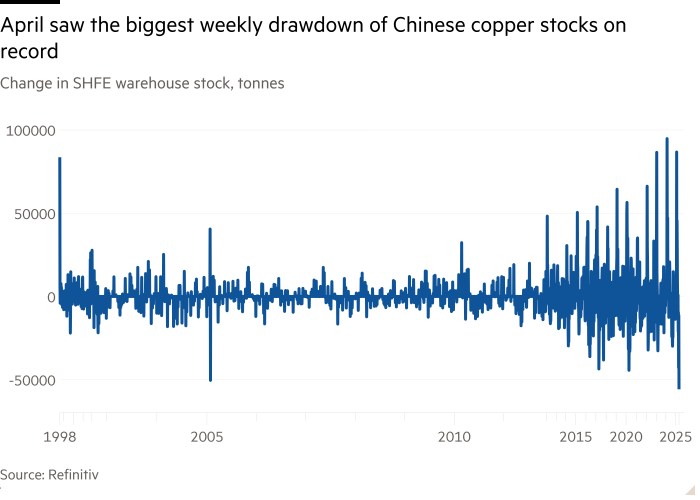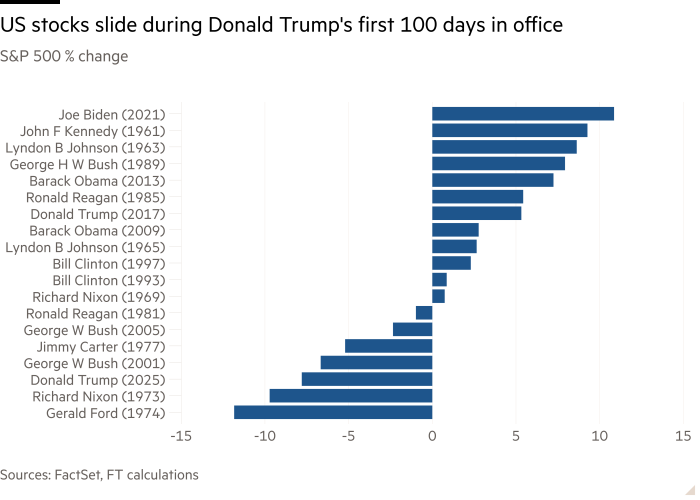China’s copper supplies set to run out as US tariffs bite, says Mercuria

Unlock the Editor’s Digest for free
Roula Khalaf, Editor of the FT, selects her favourite stories in this weekly newsletter.
China’s copper stockpiles are on track to dwindle to nothing in just a few months, as the market suffers “one of the greatest tightening shocks” in its history on fears of US tariffs, according to senior executives at commodities trading house Mercuria.
Huge US demand, as buyers rush to get their hands on copper ahead of the potential imposition of levies by the Trump administration, was sucking imports of the metal into the country from the rest of the world and setting it up in direct competition with China for supplies, said the Geneva-based group.
Chinese stocks of copper have rapidly declined over the past few weeks, and “at the current pace of draws, those Chinese inventories could deplete [to zero] by the middle of June”, Nicholas Snowdon, Mercuria’s head of metals and mining research, told the Financial Times.
The country’s inventories fell by almost 55,000 tonnes to 116,800 tonnes last week, the biggest weekly drop on record, according to Shanghai Futures Exchange data.
This “is potentially going to be one of the greatest tightening shocks this market’s ever seen”, Snowdon said. Beijing had a “razor thin inventory buffer” to meet domestic demand, he added.
Kostas Bintas, the company’s head of metals and mining, said the US was for the “first time” competing with China for supplies of copper, which was likely to supercharge prices.
The impact of US protectionism on the copper market adds to pressure from Chinese domestic demand and retaliatory levies that could hit vital flows of copper scrap.
Metals buyers have been importing large amounts of copper into the US ahead of possible tariffs, which could result from an investigation initiated by US President Donald Trump into alleged “dumping and state sponsored overproduction” of the metal. He has already imposed a 25 per cent levy on aluminium and steel imports.

Copper stocks in Comex warehouses in the US have climbed sharply this month to their highest level on Friday since 2018.
Helping drive supplies to the US is a trading arbitrage created by investors’ fear of tariffs. This has pushed up the price of the metal on New York’s Comex exchange in comparison with prices on London’s London Metal Exchange.
This so-called spread has created a lucrative arbitrage opportunity for traders willing to buy copper futures contracts in London and sell contracts in New York. The spread stood at nearly $1,200 per tonne on Monday, having risen above $1,600 in March, well above its long-term average.
Some traders who had large commitments to sell copper on Comex have been urgently trying to get their hands on additional tonnes into the US to cover those short positions before any new tariffs were introduced, said Bintas.

Retaliatory levies imposed by China on US imports could also hit the crucial copper scrap market, analysts said, adding to the tightness in the Chinese market.
That could worsen if the US imposes a ban on the export of copper scrap, of which it is a big exporter. It shipped 960,000 tonnes in 2024, with almost half going to China, according to commodity pricing agency Fastmarkets.
In January and February, the latest data available, the US exported 142,000 tonnes in total, compared with 149,000 during the same period last year.
Andrew Cole, a metals analyst at Fastmarkets, said he expected “a significant plunge in scrap shipments from the US to China in March to May at the very least.
“That’s what will lead to the escalation of supply squeeze in China we have been expecting to develop as the year progresses,” he said.
However, while Chinese stocks were being depleted, in reality markets would react before stocks reached zero, with higher prices attracting more imports of copper and scrap, said Snowdon.
“That comes at the point of record pull of copper units into the US. As those two forces meet that creates an unprecedented competition for copper,” he said.




